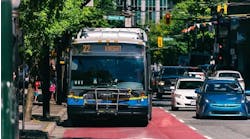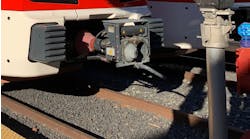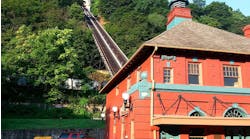Whether it's a result of recent bad winters or just the impact of more and more traffic, local roads and streets have taken a serious beating throughout Wisconsin.
Potholes, sunken manhole covers and deteriorating concrete and asphalt are taking their toll on cars and the nerves of the people who ride in them. Many communities and counties have fallen behind on road maintenance in recent years because of budget shortfalls.
But we'll just have to learn to live with the disintegrating roads and streets thanks to yet another curious set of priorities on the part of the Scott Walker administration.
The new Wisconsin budget, which is headed full speed to implementation, includes massive cuts to Wisconsin schools, fewer dollars for the working poor, more tax breaks for big business and, yes, less money to help the state's already-beleaguered municipalities fix streets and roads. (Madison is on the verge of losing $1 million.)
Instead, the budget that's being fashioned by the Walkerite-dominated Joint Committee on Finance will effectively shift transportation dollars away from the locals and into the hands of the big road builders who gave so generously to get Walker elected.
While local road aid is headed for what looks like a $35 million cut, some $328 million more is being earmarked for new highway construction by shifting automobile sales tax revenue, which has historically gone to the general fund, into the transportation budget. Further, more dollars for big highways are being freed up by shifting public transit out of the transportation budget and into the general fund, where public transportation will be more vulnerable to indiscriminate budget cutting.
The increased spending for new highways has raised eyebrows around the state.
The Wisconsin Public Interest Research Group, for instance, recently issued a report that identified four highway projects as "highly questionable."
"Gov. Walker's transportation budget is spending gone wild on questionable projects," the group maintained after studying all the projects that Walker is pushing. "Rather than prioritizing Wisconsin's existing roads and transit service, Gov. Walker has chosen extravagant and unnecessary ribbon-cutting projects."
Included in WISPIRG's list of "boondoggles" is the widening to six lanes of I-90 south of Madison at a cost that could hit $1.5 billion. "WisDOT has inexplicably chosen the most expensive option for construction in every case on this project," the group's report said. Further, traffic count and crash data on the highway are nearly 10 years old and don't support widening the highway.
Highway 15 is scheduled to be widened in Outagamie County even though the DOT's official internal statement says that an intersection improvement might be a lower-cost alternative. Further, the level of service on the highway isn't expected to deteriorate until 2040. Yet the $125 million project is proceeding.
Plus, there is little justification provided by DOT for the nine-mile, $125 million Highway 38 project through rural Caledonia between Milwaukee and Racine, a route, WISPIRG maintains, that will parallel the already-existing I-94 less than four miles away. And supporting documents do not call for a $390 million proposal to widen the Tri-County Freeway in Winnebago and Calumet counties.
So brace yourselves for some bumpy rides on your trips to work, school and the grocery store. All of this is courtesy of a governor who decided that spending a couple of million dollars to subsidize a passenger train was too costly.
Copyright 2008 LexisNexis, a division of Reed Elsevier Inc. All rights reserved.
Terms and Conditions | Privacy Policy


